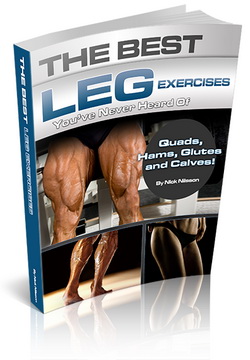It's pretty easy to understand that to achieve proper benefits with any given weightlifting exercise you must know the proper techniques and do it the right way. Incorrect lifting technique can work the wrong muscle groups, slow down your progress, or, even worse, result in strain or other injuries.
There is an idea of "no pain - no gain" shich refers to the burn or the tingle you get when you have worked a muscle to the point that will result in its coming back stronger. However, weight lifting is not supposed to injure you, and if it does, you are either using too much weight or the wrong technique.
NOTE: This article is for the ordinary person working out for their own goals and personal achievement. Someone training for professional competition is going to go far beyond the basics of this topic.
Okay, one of the most common weightlifting repetition exercises is the Squat.
 The Squat, which can be effectively done with either free weights, or various all-in-one exercise machines, is recognized by most athletes as one of the best weight lifting exercises there is to build lower body and leg strength...and, to burn fat. The squat is a weight lifting exercise primarily targeting the quadriceps (thigh muscles) and the glutes (buttocks). But, when done correctly it also exercises the hamstrings, the calves, and the lower back.
The Squat, which can be effectively done with either free weights, or various all-in-one exercise machines, is recognized by most athletes as one of the best weight lifting exercises there is to build lower body and leg strength...and, to burn fat. The squat is a weight lifting exercise primarily targeting the quadriceps (thigh muscles) and the glutes (buttocks). But, when done correctly it also exercises the hamstrings, the calves, and the lower back.
Many weight lifters consider the squat "The King of All Exercises" because it works so many muscles at once and builds muscle mass so quickly.
Ironman Tri-Athlete, Ray Fautex says that if you only had 15 minutes a day to do one exercise make it squats.
SQUAT TECHNIQUE:
A simple exercise to perform, the squat is done by bending at the knees and hips and lowering the torso between the legs, and then returning to a standing position.
During the exercise, the torso should remain as upright as possible.
When doing squats, try to keep your back straight. Your feet should be about shoulder length apart, and keep your toes pointed forward. To get started if you have not been doing squats, try it a few times with no weight. If it feels a little difficult you are probably doing it right. :)
 It is critical to keep the back straight during
squats or serious injury to the lower back can occur. If you already
have a weakened lower back due to a previous injury or condition, a
weight belt could be worn during squats to help support the lower back. Feet should remain flat
on the floor. To maintain proper balance during the upward motion of
the squat, force should be exerted from the heel of the foot and not
the toes. If squatting with a particularly heavy weight you should use
a squat cage, or have a spotter to help you return the barbell to a safe resting position after the squats.
It is critical to keep the back straight during
squats or serious injury to the lower back can occur. If you already
have a weakened lower back due to a previous injury or condition, a
weight belt could be worn during squats to help support the lower back. Feet should remain flat
on the floor. To maintain proper balance during the upward motion of
the squat, force should be exerted from the heel of the foot and not
the toes. If squatting with a particularly heavy weight you should use
a squat cage, or have a spotter to help you return the barbell to a safe resting position after the squats.
If you have difficulty keeping your heels on the floor, you might try putting a piece of wood under them. This helps me.
TYPES OF SQUATS
The most common squat is the back squat - were the
barbell is held behind the head, across the upper back. But there are
dozens of variants. Such as the Hack Squat where the weight is held
behind the legs.
The Overhead Squat, which is my particular favorite - squatting while holding the barbell at full extension over your
head. Beginners note, this is a fairly advanced version and you should be in good shape first.
There are several Squats where you hold the barbell in front of you like the aptly named Front Squat, where it is gripped with your arms
folded across your chest, or the Zercher Squat, where it is held in the crook of the arms.
The squat is a great weightlifting exercise, but, by its very nature a very rigorous one. It is highly recommended that if you are not familiar with it, or if you are experiencing pain, you should learn proper squat technique from an experienced weight lifter or professional trainer to avoid potential serious injury.
Need to know more about squats? That's because you don't know squat about squats.


